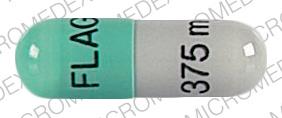Flagyl 375 and Alcohol/Food Interactions
There are 2 alcohol/food/lifestyle interactions with Flagyl 375 (metronidazole).
Metronidazole Food/Lifestyle
Major Food Interaction
Consumption of alcoholic beverages or products containing alcohol or propylene glycol during treatment with metroNIDAZOLE is not recommended. Doing so may occasionally trigger a reaction in some patients similar to the disulfiram reaction, which includes unpleasant effects such as flushing, throbbing in head and neck, throbbing headache, difficulty breathing, nausea, vomiting, sweating, thirst, chest pain, rapid heartbeat, palpitation, low blood pressure, dizziness, lightheadedness, blurred vision, and confusion. Rarely, more severe reactions may include abnormal heart rhythm, heart attack, heart failure, unconsciousness, convulsions, and even death. Patients treated with metroNIDAZOLE should continue to avoid using any products containing alcohol or propylene glycol for at least 3 days until after completion of therapy. Talk to your doctor or pharmacist if you have questions on how to take this or other medications you are prescribed. It is important to tell your doctor about all other medications you use, including vitamins and herbs. Do not stop using any medications without first talking to your doctor.
Switch to professional interaction data
Metronidazole High Blood Pressure (Hypertension)
Moderate Potential Hazard, High plausibility
metronidazole - sodium
Flagyl I.V. RTU (brand of metronidazole ready-to-use injection) contains 14 mEq of sodium per each 500 mg dose of metronidazole. The sodium content should be considered when this product is used in patients with conditions that may require sodium restriction, such as congestive heart failure, hypertension, and fluid retention.
Switch to professional interaction data
Flagyl 375 drug interactions
There are 395 drug interactions with Flagyl 375 (metronidazole).
Flagyl 375 disease interactions
There are 7 disease interactions with Flagyl 375 (metronidazole) which include:
More about Flagyl 375 (metronidazole)
- Check interactions
- Compare alternatives
- Drug images
- Side effects
- Dosage information
- During pregnancy
- Drug class: amebicides
- Breastfeeding
Related treatment guides
Drug Interaction Classification
| Highly clinically significant. Avoid combinations; the risk of the interaction outweighs the benefit. | |
| Moderately clinically significant. Usually avoid combinations; use it only under special circumstances. | |
| Minimally clinically significant. Minimize risk; assess risk and consider an alternative drug, take steps to circumvent the interaction risk and/or institute a monitoring plan. | |
| No interaction information available. |
See also:
Further information
Always consult your healthcare provider to ensure the information displayed on this page applies to your personal circumstances.


